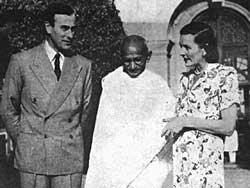 Sometimes it's best to be impulsive, to move quickly and damn the consequences. One person who thought that way was Lord Mountbatten, the last Viceroy of British India and the man who brought freedom to much of this subcontinent.
Sometimes it's best to be impulsive, to move quickly and damn the consequences. One person who thought that way was Lord Mountbatten, the last Viceroy of British India and the man who brought freedom to much of this subcontinent. Mountbatten-named Viceroy in 1947 by the newly-elected and avowedly anti-imperialist Labour government in London-arrived in India soon after his appointment. In his early talks with Jawaharlal Nehru and Gandhi, he bonded with the two men and accepted the need for an immediate end to British colonial rule across South Asia.
What shocked many was his decision-under plenipotentiary powers granted by Prime Minster Clement Atlee-to free India in six months time. There were the predictable reactions. Conservatives, led by Winston Churchill, howled with outrage that the Indians weren't ready, that Britain's eternal flame was being snuffed too soon. Civil service mandarins in Delhi and London quivered with fear at the amount of work that needed to be done. Sectarians on either side of the partition debate stoked fires of hatred. Journalists said smugly that it couldn't be done. Smug is something we do.
But Mountbatten, Nehru, Sir Cyril Radcliffe, Jinnah, Gandhi, Sardar Patel and Atlee all owe their place in history to the success of that deadline. In mid-August, India and Pakistan became sovereign nations and whatever their patchy records since then, they remain so. Free, proud of some things, unquestionably independent of foreign control.
Nepal has never had to go through that. From its inception four centuries ago, this has been a sovereign independent state. True, British Residents and Rana Prime Ministers co-operated closely before 1950-51, and India played a role in the Nepali Congress struggle for democracy and freedom. But what remained intact throughout was Nepal's freedom to make its own decisions, to regret its own mistakes and to celebrate its own successes.
Or have they? Increasingly, even rich nations are less independent than they perceive themselves to be. The influence of superpowers or the sole superpower impacts upon us all. Globalisation's most irresistible forces-led by multinational companies-push towards convergence in capital and labour policies. The world's interlinked market economy actually restricts freedom of action of sovereign governments. Countries most in need of emergency assistance or long term support have a choice in setting economic policy. And those nations who have become beholden to development aid and the plethora of agencies and bureaucracies that dispense it, some would say are the least free of all.
Necessity is the mother of invention. If the Finance Minister of Nepal is getting too little revenue from tax, he has to turn to the capital markets. And if his country's credit rating isn't very good because of the Catch 22 of declining revenues, then he has to ask for help. That help flows into general revenues and specific programmes as a perceived reward for economic policies dictated somewhere else. Similarly, aid from friendly countries is often predicated upon recipients doing as the are told. Over the years, we've had foreign officials telling Nepal that they can only invest their taxpayer's money into projects that promote such things as good governance, gender equity, social justice or-as ever-freer markets. The infamous 1998 World Bank report, Assessing Aid, argues that aid should not be good money sent after bad, and that means rewarding success as measured by goals set by donors. Even large non-governmental organisations look to influence their partners in development, with agendas set elsewhere.
So what does all this have to do with Mountbatten and 1947 and all that? At the moment, nothing. But I would suggest to the barons of foreign assistance in this town, and around this magnificent land, that their days of calling the shots in poorer countries may be numbered. It's plain at the moment that not enough opportunity or benefits reach the poor, even the working classes, who are increasingly resentful of the four-wheel-drive vehicles and special tax privileges that bring the interchangeable expatriate-expert to their homeland. The distorted labour markets from international agency salary levels sap local entrepreneurs of administrative or creative heft on their office staff. The school fees, rents and property prices climb inexorably.
I can foresee a new breed of politician-in Nepal, Bangladesh and other aid-dependent states-who cry "enough" and demand a different kind of development paradigm, one that puts opportunities and resources in the hands of local people, who also make their own political decisions. One that might emphasise education or health, with devolution of power and accountability widespread. And it could all come as quite a surprise to an orthodox development elite. Think of it as "Freedom at Midnight".



